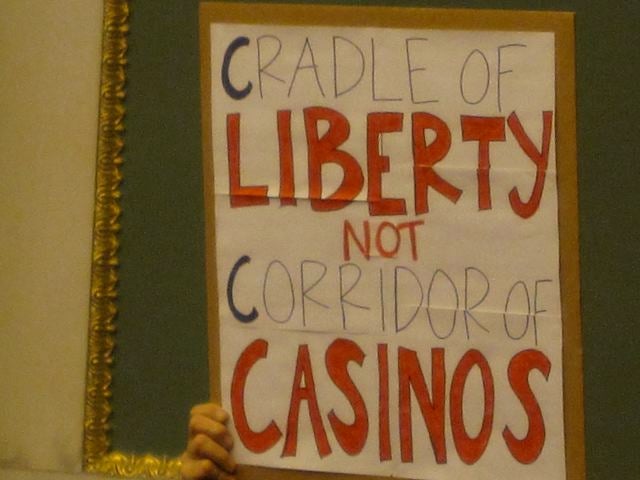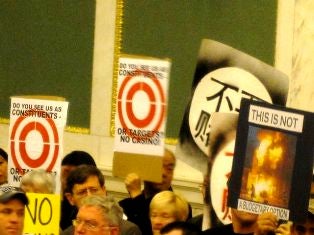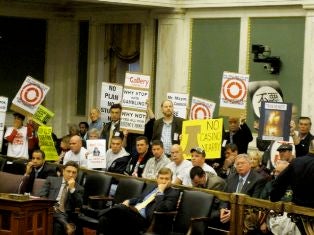Council passes Center City CED

Nov. 13
By Kellie Patrick Gates
For PlanPhilly
Philadelphia City Council today passed legislation that would allow a casino to operate at The Gallery at Market East, despite protests from residents of Chinatown and other nearby neighborhoods. It now awaits Mayor Nutter’s signature.
The casino in question is Foxwoods. Originally proposed for the waterfront in South Philadelphia, Foxwoods announced in September that it would consider a move to The Gallery after months of pressure from city leaders and community activists.
“Today was an important step toward passing the legislation needed to further evaluate The Gallery as an alternative site to develop our project,” said Foxwoods spokeswoman Maureen Garrity. “We appreciate the efforts of the City and City Council in getting the legislation to this point.”

Those who oppose the casino were much less pleased with City officials and Council members.
“The city just put all the power in Foxwoods’ hands,” said Asian Americans United Executive Director Ellen Somekawa after the meeting.
But Somekawa said no one was giving up. She and others headed to Mayor Michael Nutter’s office to deliver a letter asking him to meet, in person, with Chinatown leaders before signing the legislation.
“In the name of fairness, please come to speak directly with us before making your decision. There were less than six weeks between the time we first heard about this proposal and the introduction of a zoning bill into City Hall,” the letter read. “No other community has faced such a rushed process, received so little information, or had so little time to respond. We know that you will agree with us that Chinatown deserves the same respect and consideration as any other neighborhood in Philadelphia.”
Nutter has accepted that invitation. He will meet with Chinatown leaders before making his signing decision, his spokesman, Douglas Oliver, said in an email late Thursday afternoon. “We expect that meeting to occur sometime in the next few days.”
The legislation becomes law whether Nutter signs it or not. If he vetoes it, it would take 12 City Council votes to override his veto. Both of the casino zoning-related bills that passed Thursday received more votes than that. The one that created a special Commercial Entertainment District – the classification that allows casinos – for the Market East corridor passed 15-0; the one that would reclassify The Gallery with that designation, provided Council approves a plan of development for a casino, passed 14-0 with one abstention.
But those whose concerns with the legislation are a portion that would change signage rules in the area to allow rooftop, electronic, and spinning signs were given hope that adjustments might later be made. Councilman Frank DiCicco, who introduced the legislation, said he would consider making changes relating to signage and introducing a new bill next week.

While Council passed both a bill creating a CED classification for Center City and another that would re-zone The Gallery from its current C-5 commercial designation to CED, but the second bill will only go into effect if the city Planning Commission and City Council approve Foxwoods’ plan of development.
That plan, which must include detailed information such as architectural renditions and traffic studies, does not yet exist.
This is one of the issues that has angered the activists. Why, they ask, would the city even consider changing the zoning for a project they know so little about?
And why would they create zoning that would allow a casino at The Gallery before a thorough study of the effects a casino would have on families and businesses? Why not wait until this information is in hand, and then make a decision?
City officials and DiCiccio, who represents the district where The Gallery is located and introduced the zoning legislation, say this is just the beginning of the process, a good faith effort to encourage Foxwoods to create a plan of development. And, they say, if that plan doesn’t meet the standards of the Commission and the Council, they will vote it down.
The CED marks the beginning of a complete review, they’ve said, because without it Foxwoods would never submit the details the city needs to determine whether or not The Gallery is the right location for a casino.
Foxwoods officials have also called the CED a necessary first step before they’ll submit a design.
But that was no consolation to the activists who comprised most of the audience at the Council meeting this morning. They have been urging council to slow down the process and not pass the legislation without first receiving the detailed plans. Many from Chinatown worry that a casino will harm families with gambling addiction and also harm businesses by taking away their customers.
While there was no public comment period at the meeting, the protestors made their feelings very clear. “Shame on you! Shame on you!” they chanted after the first of the two votes. “Railroad! Railroad! Railroad.”
Council chairwoman Anna Verna pounded her gavel. “The vote has been cast and your shouting like that is not going to change it!” she said.
Neither DiCicco, nor anyone from the mayor’s office or planning department spoke of the prospective benefits or downfalls of having Foxwoods at Market East at the meeting, but in the past, they have said that The Gallery location offers benefits that the original waterfront location would not, including potentially serving as a catalyst to enliven the lagging Market East corridor.
DiCicco says the state legislature and the State Supreme Court have, with the casino legislation and a string of 14 casino-related decisions that went against the city, stripped the city’s power to decide whether there will be casinos in Philadelphia. “There will be two casinos here,” he has said repeatedly. The only question is where.
Thanks to the State Supreme Court, DiCicco says, Foxwoods already has CED zoning. It also has a preponderance of the permits it needs to start construction at the Columbus and Reed site, he says, and a court appointed Special Master to see that the city doesn’t drag its feet in processing what remains.
Mayor Nutter, his planning team, DiCicco and many others from the city agreed with residents that the South Philadelphia site was a bad place to put a casino. Chief among the city’s concerns: Traffic. That site would rely almost entirely on cars, taxis or buses to get customers to the slots, they said, and the area is already congested.
While insisting the Foxwoods-at-the-Gallery proposal is not a done deal, Nutter and his top advisors, DiCicco and other elected officials say that not only might The Gallery site rejuvenate the Market East corridor, it would not only not have the traffic issues, since many customers could take public transportation or walk from nearby hotels or the Convention Center.
This accessibility is chief among Chinatown’s concerns. “Do you see us as constituents, or as targets for casinos?” asked one of the protester’s signs. The activists say that Asian Americans are particularly susceptible to gambling addiction.
City officials have said these potential social ills are being studied, but the residents want more specifics.
DiCicco says it’s an either-or at this point: Foxwoods will either open at The Gallery, or, if the city denies that, it will open on the waterfront. So, he says, the city is obligated to see if the Gallery is a better option.
But the activists say that DiCicco and city officials either have already made up their minds or are underestimating the amount of power they have.
At the meeting at which Foxwoods announced its willingness to explore The Gallery, Michael Thomas, Chairman of the Manshantucket Pequot Tribal Nation – the 30 percent owner of Foxwoods – said if it did not work out, he would be open to considering other spots.
Foxwoods spokeswoman Garrity would not say whether or not this willingness to look at additional sites still holds. “Foxwoods’ focus is on evaluating The Gallery site to determine whether it is a viable location for our project,” she said.
Daniel Hunter, a co-founder of Casino-Free Philadelphia, believes Foxwoods would have good reasons to wait for a city-suggested spot rather than rush to build at the waterfront. The traffic issues at the waterfront site haven’t gone away and would still have to be resolved, he said. And the community opposition remains. With the economy the way it is, Hunter said, Foxwoods would be more interested in an existing building than in the empty, open property on Delaware Avenue.
Hunter said Thursday afternoon that his organization will now work to remind city leaders that they still have power and they still have options, and that planning must start now.
Planning Commission director Alan Greenberger has said the thorough review of Foxwoods’ proposal will begin with public hearings before the Planning Commission even before the proposal is entirely complete.
Once the complete plan of development is in hand, the Planning Commission will hold a hearing and make a recommendation to City Council, which makes the final decision.
Foxwoods’ Garrity said the casino developers will not begin working on a plan of development until the CED legislation is finalized. “The Mayor has not yet signed the legislation,” she said. “After zoning is complete, we will enter into the plan of development process where our architects and other consultants will move from the evaluation phase to the design phase.”
Garrity said she couldn’t estimate how long it would take Foxwoods to get something preliminary to the Planning Commission, nor how long it would take to finish a complete plan of development.
Thursday, every council member present voted for the bill that would change The Gallery’s zoning, except for Councilman Curtis Jones, who abstained. He wanted to ask DiCicco a question, and Verna told him he had missed the appropriate time to do so.
But Verna did allow Jones to question DiCicco regarding the other bill, the one that created an amended CED classification for Center City. Jones said concerns about the losening of the signage provisions had come to his attention, and he asked DiCicco what signs would be allowed if the legislation passed.
DiCicco said he, too, knew of the concerns raised by SCRUB, also known as the Society Created to Reduce Urban Blight, and had spoken Wednesday evening to Executive Director Mary Tracy. DiCicco said he was open to possibly making some adjustments after he and his staff had a chance to do some analysis. He said he might introduce new legislation next week. Jones hesitated, but in the end voted in favor of the legislation with his colleagues.
“My preference would have been that they would have held off on this bill and fixed it and then voted,” Tracy said, but she’s happy DiCicco is willing to work with her.
Tracy has been doing a lot of work herself, including speaking to the Design Advocacy Group, which yesterday sent a letter of its own to DiCicco asking for changes in the legislation relative to signing. Their suggestion in a nutshell: Stick with the rules in the current C-5 zoning, and require those who want something else to seek special approval.
Tracy said she’d love that approach, but she’s also preparing to negotiate with DiCicco on a compromise.
Contact the reporter at kelliespatrick@gmail.com
WHYY is your source for fact-based, in-depth journalism and information. As a nonprofit organization, we rely on financial support from readers like you. Please give today.



